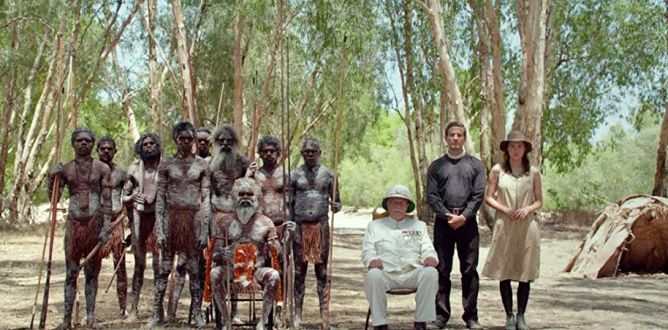High Ground Parent Guide
In honestly confronting Australian colonial history, this film doesn't shy away from the violence that undergirded it.
Parent Movie Review
Trained as a sniper in WWI, Travis (Simon Baker) starts working with law enforcement in northern Australia’s outback only to unwittingly become part of a massacre and face self-imposed exile when he refuses to participate in the cover-up. Twelve years later, he’s dragged back in to the conflict as Baywara (Sean Mununggurr), a survivor of the massacre, starts raiding local settler stations. Travis only participates because he believes he can prevent further violence, and his honesty encourages young Gutjuk (Jacob Junior Nayinggul) to help him track the man down. But Travis is more or less alone in his determination to find a peaceful resolution, and the others are not patient.
My first thought when I read the description for this film was “Oh, like Quigley Down Under.” At first glance, the movies share the same basic premise: white marksman finds himself struggling to do the right thing in the face of colonial genocide. But High Ground is far less action-focused and far more concerned with the fate of Aboriginal people. Director Stephen Johnson worked with Aboriginal elder Wityana Marika on the story for the film, and the result is a portrayal of Aboriginal culture which is both informed and sincere – at least, as far as one middle-class white North American can tell. If nothing else, you can see that the filmmakers are interested in telling a story which is not primarily about the white guy with a gun. It’s a story about the brutal consequences of colonialism as they tear apart existing communities and cultures. In order to tell that story, the focus has to be on the Aboriginal characters.
Jacob Junior Nayinggul, who plays Gutjuk, and the rest of the Aboriginal cast are the reason this film is as compelling and relevant as it is. Without their input and contribution, this really would just be another version of Quigley, sans Tom Selleck. Films trying to accurately display indigenous cultures are not common, even in 2021, and this one is particularly good.
Now, before I keep raving about how relevant and important this movie is, I should point out that this is not a film for children. Graphic violence, frequent profanity, and a non-explicit rape scene push this movie into Restricted territory and render it deeply upsetting to watch. Which is, in fairness, the point of the film. You can’t really confront colonial history without some portrayal of what colonialism looked like on the ground, just like you can’t make a movie about the holocaust without talking about a concentration camp. So while these depictions are unpleasant, they are also crucial in understanding history – not just in Australia but in North America and any other region where the effects of colonialism linger into the present. I can see this being a teaching aid for high school or university students talking about colonialism, because while the story itself is fictional, the history is all too real.
Directed by Stephen Maxwell Johnson. Starring Simon Baker, Jacob Junior Nayinggul, and Jack Thompson. Running time: 104 minutes. Theatrical release May 14, 2021. Updated October 2, 2021Watch the trailer for High Ground
High Ground
Rating & Content Info
Why is High Ground rated Not Rated? High Ground is rated Not Rated by the MPAA
Violence: Individuals, including unarmed women and children, are shot and killed. One peron is killed with a spear and another is beaten to death.
Sexual Content: Female toplessness and buttocks of both genders are seen in a non-sexual context as part of traditional Aboriginal clothing. There is a scene depicting rape without graphic detail or nudity, and dialogue describing child sexual abuse.
Profanity: There are eleven extreme profanities, six scatological curses, and sporadic use of terms of deity and mild profanities.
Alcohol / Drug Use: None.
Page last updated October 2, 2021
High Ground Parents' Guide
Do you live in a former or current colony? What are the legacies of colonialism where you live? What are some of the consequences of that conquest? How does your nation address that past? How does Australia specifically address these problems? What are some of their ongoing concerns?
Stephen Johnson gave an interview with Cinema Australia, which can be found at the following link. https://cinemaaustralia.com.au/2021/01/12/interview-stephen-johnson/
What do you think was important to him about this film? How did he try to make it more accurate and more faithful to the real stories of colonialism?
For more information about the Aboriginals of Australia and the history of British colonization, you can check these links:
Australians Together: Colonisation
BBC: Aboriginal Australians “still suffering effects of colonial past”
The Guardian: Don’t tell me to “get over” a colonialism that is still being implemented today
Wikipedia: History of Indigenous Australians
Aboriginal Art & Culture: Aboriginal History
Loved this movie? Try these books…
An early account of growing up Aboriginal in Australia is My Place by Sally Morgan.
Home Video
Related home video titles:
Perhaps one of the best known films about Aboriginal Australians is Rabbit-Proof Fence, which focuses on three young girls who try to escape from their oppressors. A more action-focused option (which has rather less to do with the Aboriginal stories and rather more to do with white cowboy action) is Quigley Down Under. An American portrayal of colonial consequences can be found in Hostiles.

